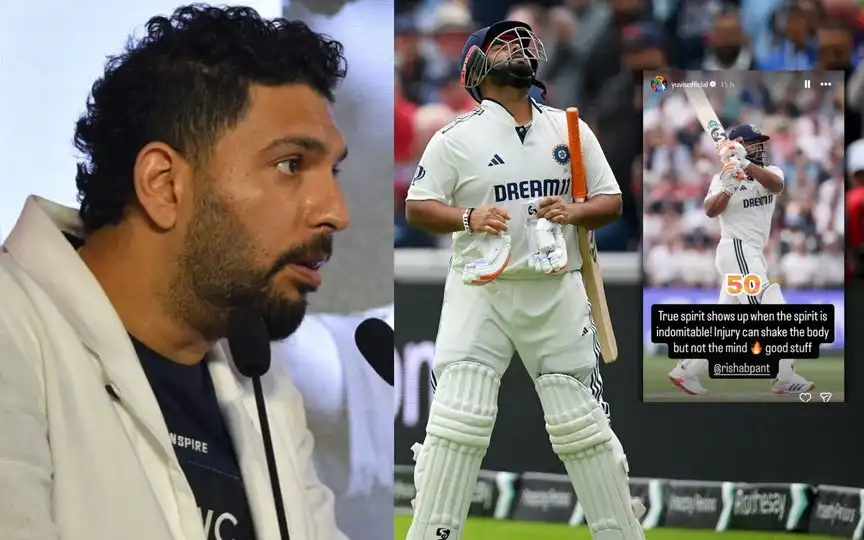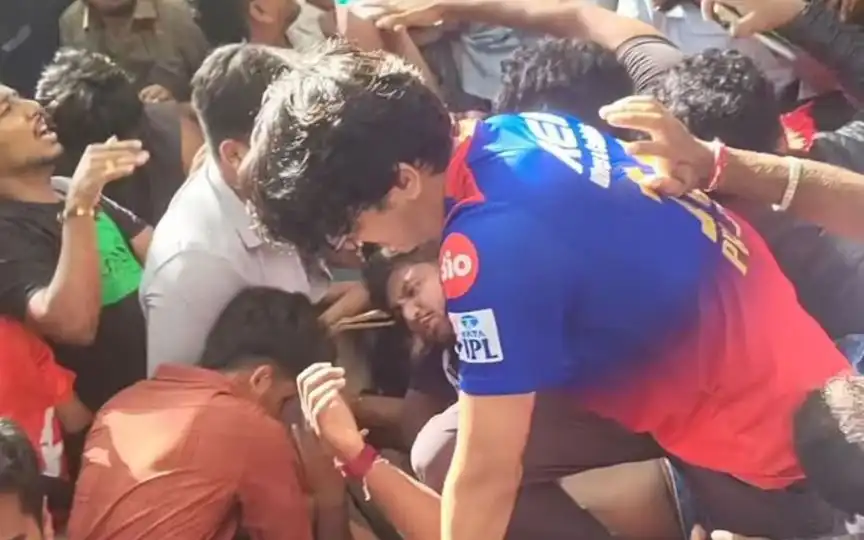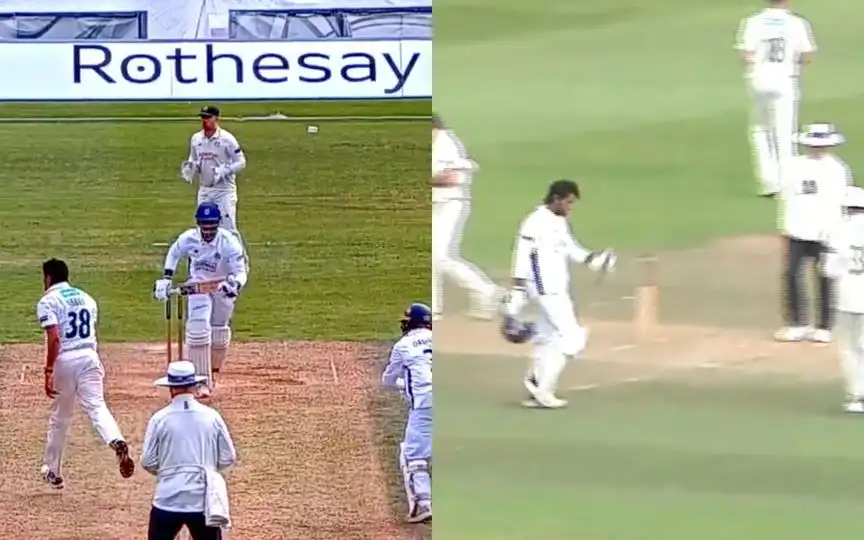![Sachin Tendulkar and Rishabh Pant [Source: @Interstellar06/x.com, AP Photos]](https://onecricketnews.akamaized.net/parth-editor/oc-dashboard/news-images-prod/1753424884185_sachin_rishabh.jpg?type=hq) Sachin Tendulkar and Rishabh Pant [Source: @Interstellar06/x.com, AP Photos]
Sachin Tendulkar and Rishabh Pant [Source: @Interstellar06/x.com, AP Photos]
In the annals of cricket history, certain phrases transcend the boundaries of language and become universal symbols of courage. "Main Khelega" - literally meaning "I will play" - represents more than just broken Hindi spoken by a bloodied 16-year-old in Pakistan. It embodies the very essence of what makes sport beautiful: the refusal to surrender when everything seems lost.
Thirty-five years after Sachin Tendulkar first uttered those words at Sialkot, another Indian cricketer channeled the same spirit at Old Trafford. Rishabh Pant, with a fractured metatarsal bone in his right foot, limped out to the crease, earning a standing ovation from a Manchester crowd that recognised they were witnessing something extraordinary.
December 1989, Sialkot: The Birth of a Legend
The story begins in Pakistan during the dying days of a decade that saw the fall of the Berlin Wall and the dawn of a new world order. A cherubic 16-year-old from Mumbai, barely five-and-a-half feet tall, walked into one of cricket's most hostile environments. The Pakistani pace attack of Imran Khan, Wasim Akram, and Waqar Younis was at its peak - a triumvirate that could terrorise batters across the globe.
India were struggling at 38 for 4 in the fourth Test when Sachin Tendulkar joined Navjot Singh Sidhu at the crease. The pitch was green, the stakes were high, and the Pakistani quicks sensed blood. Then came the moment that would be etched in cricket folklore forever.
Waqar Younis, who was also making his debut in the series, unleashed a vicious bouncer that caught Tendulkar flush on the nose. The teenager crumpled, blood streaming down his face, his while shirt turning crimson. The entire ground fell silent. Pakistani players, including the notoriously tough Javed Miandad, showed genuine concern. The physio rushed out. Sidhu advised his young partner to leave the field.
But as everyone waited for the stretcher, Tendulkar spoke those words that would define not just his career, but an entire generation's approach to adversity: "Main Khelega."
What followed was pure poetry written in pain. Tendulkar rose, steadied himself, and hit the very next ball from Waqar for a boundary. Over the next three hours, he crafted a gritty 57 that saved the Test match for India and announced the arrival of someone special. More than the runs, it was the statement that this boy would not be intimidated, would not back down, would always find a way to fight.
July 2025, Manchester: Echo After 35 Years
Fast forward to Old Trafford, where another Indian wicket-keeper batter faced his own moment of truth. Rishabh Pant, 27 years old and already a veteran of memorable comebacks, had just suffered what doctors would later confirm as a fractured metatarsal bone. The prognosis was clear: six to eight weeks of rest. But cricket, like life, does not always follow medical advice.
On Day 2 of the fourth Test, with India needing every run to stay competitive in the series, Pant emerged from the pavilion limping down the stairs. The Manchester crowd rose as one, recognising the enormity of what they were witnessing. Here was a man choosing to walk into pain, choosing his team over his body, choosing to embody the same spirit that Tendulkar had shown all those years ago.
He did not need to say "Main Khelega" - his actions spoke louder than words. He completed his fifty, helped India cross 350, and reminded everyone why cricket remains the most beautiful of games. The six he hit off Jofra Archer wasn't just a shot; it was a declaration that the human spirit, when truly tested, often finds reserves of strength that defy logic.
The Thread That Holds
What connects these two incidents isn't just the Indian jersey or the refusal to surrender. It is something deeper - the understanding that sport, at its highest level, isn't just about skill or technique. It is about character. It is about those moments when comfort and safety beckon, but something deeper calls you to stand and fight.
Tendulkar's "Main Khelega" came at the beginning of what would become cricket's most decorated career. One hundred international centuries, 34,357 runs, and 24 years of carrying a nation's hopes would follow. But perhaps none of it would have been possible without that moment in Sialkot when a bleeding teenager chose defiance over defeat.
Pant's moment came against the backdrop of his own remarkable journey - a return to international cricket after a life-threatening car accident in 2022, establishing himself as one of the world's premier wicket-keeper batters, and now this act of supreme courage that has already entered cricket folklore.
Beyond The Boundaries
These moments matter because they remind us that sport is ultimately a metaphor of life. We all face our bouncer moments when we are hurt, bleeding, and advised to retreat. The easy option is always there: the safety of the pavilion, the comfort of surrender, the relief of giving up.
But champions are made in the space between the blow and the decision. They are forged in that moment when everything in your body tells you to quit, but something in your spirit whispers: "Main Khelega."
Tendulkar set the template. Pant honoured the tradition. And somewhere, in a school ground in Mumbai, Delhi, Kolkata or anywhere cricket is played, a young player watches these moments and learns that true courage isn't the absence of fear or pain - it is the willingness to play despite both.
The Eternal Echo
As cricket evolves, as formats change, as new heroes emerge and old ones fade, certain truths remain constant. The game will always test you. Pain will always be part of the process. The temptation to surrender will always exist.
But so will the choice to stand up, wipe the blood from your or adjust the boot on your fractured foot, look the bowler in the eye, and quietly declare: "Main Khelega."
In those two words lies the entire philosophy of not just cricket, but life itself. Play on. Fight on. Never surrender.
Because sometimes, the most important innings of your life begins with the most difficult decision to stay at the crease.

 (1).jpg?type=mq)


